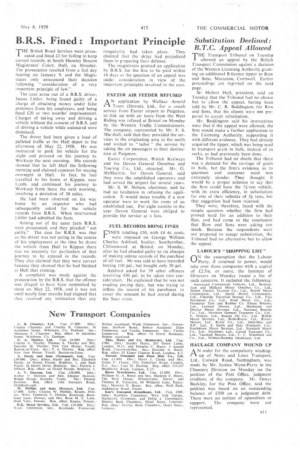B.R.S. Fined : Important Principle
Page 45

If you've noticed an error in this article please click here to report it so we can fix it.
THE British Road Services were prose' cuted and fined £2 for failing to keep correct records, at South Hunsley Beacon Magistrates' Court, Hull, on Monday. The prosecution resulted from a full day hearing on January 9, and the Magistrates only announced their decision following "consideration of a very important principle of law.".
The case arose out of a B.R.S. driver, James Littler, being found guilty of a charge of obtaining money under false pretences from his employers, and being fined £20 or two months' imprisonment. Charges of taking away and driving a vehicle without the consent of B.R.S. and of driving a vehicle while uninsured were dismissed.
The driver had been given a load of palleted traffic at the Hull depot in the afternoon of May 22, 1958. He was instructed to park his vehicle for the night and proceed on his journey to Worksop the next morning. His records showed that he left Hull the following morning and claimed expenses for staying overnight in Hull. In fact, he had travelled to his home at Kipnax, near Leeds, and continued his journey to Worksop from there the next morning, involving a deviation of 30 miles.
He had been observed on his way home by an inspector who had subsequently asked for the vehicle records from B.R.S. When interviewed Littler had admitted the facts.
Arising out of the same facts B.R.S. were prosecuted, and they pleaded not guilty." The case for B.R.S. was that as the driver was not acting in the course of his employment at the time he drove the vehicle from Hull to Kippax there was no necessity for particulars of that journey to be entered in the records. They also claimed that they were correct because they showed that he had finished at Hull that evening.
A complaint was made against the prosecution by the B.R.S. that the-offence was alleged to have been committed by them on May 22, 1958, and it was not until nearly four months had elapsed that they received any intimation that any irregularity had taken place. They claimed that the delay had prejudiced them in preparing their defence.
The magistrates granted an application by B.R.S. for the fine to be paid within 14 days as the question of an appeal was under consideration in view of the important principles involved in the case.
EXETER AIR FEEDER REFUSED
AN application by Wallace Arnold CI Tours (Devon), Ltd., for a coach service from Exeter airport to Paignton, to link up with air tours from the West Riding was refused at Bristol on Monday by the Western Traffic Commissioners. The company, represented by Mr. F. S. Marshall, said that they provided the services in the originating area in the north and wished to " tailor " the service by taking the air passengers to their destination at Paignton.
Exeter Corporation, British Railways and the Devon General Omnibus and Touring Co., Ltd., objected. Mr. G. MeM urtrie, for Devon General, said they were the established operators and had served the airport for several years.
Mr. S. W. Nelson, chairman, said he had no hesitation in refusing the application. It would mean trouble if a new operator were to work the route of an established one. For eight months in the year Devon General were obliged to provide the service at a loss.
FUEL RECORDS BRING FINES
FINES totalling £30, with £4 4s: costs, were imposed on George William Charles Ashford, haulier, Southcrnhay, Cliftonwood, at Bristol, on Monday, after he had pleaded guilty to six charges of making untrue records of the purchase of oil fuel. He was said to have recorded buying 110 gal., but bought only 50 gal.
Ashford asked for 39 other offences involving 450 gal. to be taken into consideration. He explained that he was not evading paying duty, but was trying to inflate the record of his purchases to cover the amount he had stored during the Suet crisis.




































































































